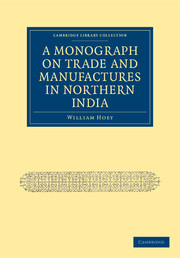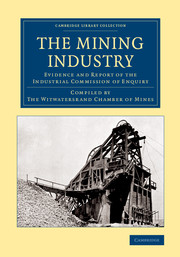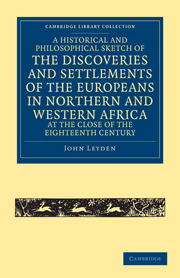Refine search
Actions for selected content:
26946 results in Economic history
Redemption theories and the value of American colonial paper money
-
- Journal:
- Financial History Review / Volume 22 / Issue 3 / December 2015
- Published online by Cambridge University Press:
- 01 December 2015, pp. 315-335
-
- Article
- Export citation
‘A new species of mony’: British Exchequer bills, 1701–1711
-
- Journal:
- Financial History Review / Volume 22 / Issue 3 / December 2015
- Published online by Cambridge University Press:
- 01 December 2015, p. 363
-
- Article
-
- You have access
- HTML
- Export citation
THE BRITISH EMPIRE AND THE ECONOMIC DEVELOPMENT OF INDIA (1858-1947)*
-
- Journal:
- Revista de Historia Economica - Journal of Iberian and Latin American Economic History / Volume 34 / Issue 2 / September 2016
- Published online by Cambridge University Press:
- 25 November 2015, pp. 209-236
- Print publication:
- September 2016
-
- Article
- Export citation
Chapter 4 - Plague, War, and Calamity
- from Part I - Politics
-
- Book:
- The Rise and Decline of an Iberian Bourgeoisie
- Published online:
- 05 November 2015
- Print publication:
- 05 November 2015, pp 92-118
-
- Chapter
- Export citation

A Monograph on Trade and Manufactures in Northern India
-
- Published online:
- 05 November 2015
- Print publication:
- 20 October 2011
- First published in:
- 1880

The Mining Industry
- Evidence and Report of the Industrial Commission of Enquiry
-
- Published online:
- 05 November 2015
- Print publication:
- 26 September 2013
Bibliography
-
- Book:
- The Rise and Decline of an Iberian Bourgeoisie
- Published online:
- 05 November 2015
- Print publication:
- 05 November 2015, pp 307-344
-
- Chapter
- Export citation

A Historical and Philosophical Sketch of the Discoveries and Settlements of the Europeans in Northern and Western Africa, at the Close of the Eighteenth Century
-
- Published online:
- 05 November 2015
- Print publication:
- 22 September 2011
- First published in:
- 1799
Copyright page
-
- Book:
- The Rise and Decline of an Iberian Bourgeoisie
- Published online:
- 05 November 2015
- Print publication:
- 05 November 2015, pp iv-iv
-
- Chapter
- Export citation
Chapter 7 - Demography, wages, and prices in the age of the black death
- from Part II - Economy
-
- Book:
- The Rise and Decline of an Iberian Bourgeoisie
- Published online:
- 05 November 2015
- Print publication:
- 05 November 2015, pp 211-253
-
- Chapter
- Export citation
Index
-
- Book:
- The Rise and Decline of an Iberian Bourgeoisie
- Published online:
- 05 November 2015
- Print publication:
- 05 November 2015, pp 345-347
-
- Chapter
- Export citation
Part II - Economy
-
- Book:
- The Rise and Decline of an Iberian Bourgeoisie
- Published online:
- 05 November 2015
- Print publication:
- 05 November 2015, pp 167-306
-
- Chapter
- Export citation
Chapter 2 - The creation of a regional capital
- from Part I - Politics
-
- Book:
- The Rise and Decline of an Iberian Bourgeoisie
- Published online:
- 05 November 2015
- Print publication:
- 05 November 2015, pp 25-63
-
- Chapter
- Export citation
Illustrations
-
- Book:
- The Rise and Decline of an Iberian Bourgeoisie
- Published online:
- 05 November 2015
- Print publication:
- 05 November 2015, pp vii-vii
-
- Chapter
- Export citation
Chapter 8 - Fruits of the urban system
- from Part II - Economy
-
- Book:
- The Rise and Decline of an Iberian Bourgeoisie
- Published online:
- 05 November 2015
- Print publication:
- 05 November 2015, pp 254-288
-
- Chapter
- Export citation
Chapter 1 - Introduction
-
- Book:
- The Rise and Decline of an Iberian Bourgeoisie
- Published online:
- 05 November 2015
- Print publication:
- 05 November 2015, pp 1-22
-
- Chapter
- Export citation
Notes on Citations, Money, Names, and Accentuation
-
- Book:
- The Rise and Decline of an Iberian Bourgeoisie
- Published online:
- 05 November 2015
- Print publication:
- 05 November 2015, pp xix-xxi
-
- Chapter
- Export citation
Tables
-
- Book:
- The Rise and Decline of an Iberian Bourgeoisie
- Published online:
- 05 November 2015
- Print publication:
- 05 November 2015, pp viii-ix
-
- Chapter
- Export citation
Chapter 5 - The Practice of government at Manresa during the Fourteenth-Century crisis
- from Part I - Politics
-
- Book:
- The Rise and Decline of an Iberian Bourgeoisie
- Published online:
- 05 November 2015
- Print publication:
- 05 November 2015, pp 119-166
-
- Chapter
- Export citation
Glossary
-
- Book:
- The Rise and Decline of an Iberian Bourgeoisie
- Published online:
- 05 November 2015
- Print publication:
- 05 November 2015, pp xvi-xviii
-
- Chapter
- Export citation
